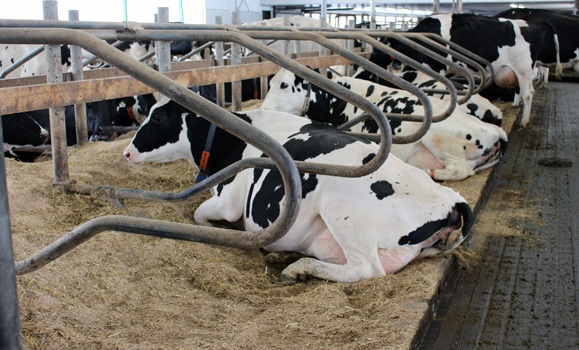News
» Go to news mainPalm oil and cows: Q&A with Dr. Alan Fredeen

Amid the recent controversy surrounding palm oil, palmitic acid, butter and dairy cows, we asked our expert in Dairy Herd Nutrition, Dr. Alan Fredeen, Faculty of Agriculture, Dalhousie University, to help us understand more about this issue.
What is milk fat?
Milk fat is the most complex natural fat in the human diet, composed of over 400 fatty acids, most of which are saturated, thus giving butter it’s characteristic hardness.
Palmitic acid (C16:0) is one of the fatty acids, naturally found in butter, which is derived equally from synthesis in the mammary gland of the cow and her diet. Humans synthesize it too.
What affects milk fat composition?
Milk fatty acid composition and butter texture are affected by the cows' diets. Palmitic acid content of milk fat can be altered by lipid supplementation.
Feeding palmitic acid to today’s very high- producing dairy cows in early lactation, when their energy requirement typically exceeds that which they are capable of consuming, is common practise in the dairy industry to displace dietary grain otherwise needed at higher, unhealthful levels to provide sufficient energy.
Does feeding palm oil to dairy cows increase the hardness of butter?
While feeding palm oil to dairy cows may increase palmitic acid content of butter and increase its hardness, experimentation is needed to determine if the amount fed in Atlantic Canada affects butter hardness before accurate statements about its effect can be made.
Is the use of palmitic acid supplement in the dairy industry an approved practice?
Palmitic acid supplements are an ingredient that is legally sold by feed companies to farmers and is approved by the Canadian Food Inspection Agency.

Dr. Alan Fredeen, PhD., Professor, ruminant nutrition and dairy systems
Dalhousie Faculty of Agriculture
Recent News
- 2024 International Society for Research on Emotion
- Fall 2024 Brightspace Course Spaces
- Assistant Registrar ‑ Recruitment, Special Events, and Campus Tours,
- Certificate of Appreciation – Public Health
- Theatre props available
- Transforming Poultry Care with Artificial Intelligence
- New Face on Campus
- Chloe Toombs ‑ Combining agriculture and engineering
